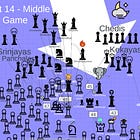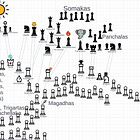Mahabharata (Mhb.) Literature Notes
a collection of points without definite beginning or end
This commentary post takes aim at the McAulay quote,[1]
Thomas Babingdon Macaulay who famously declared ‘a single shelf of good European library was worth the whole native literature of India and Arabia.’
Manmatha Dutt has this riposte in his foreword to the translation -
I once saw a survey on Substack Notes that contained a comprehensive list of languages and the iconic bards of those languages. All the romance languages were present, as were many others like Urdu, Russian, Persian, Turkic, Chinese and so on. English was Shakespeare, Greek Homer, Spanish Cervantes, Italian Dante (maybe). Though there many languages, neither Sanskrit or Vyasa were mentioned. Sanskrit and its great epic may yet be criminally underrated literature.
By the book literature
The thesis that the Mhb. is a literary masterpiece on par with the greatest of contemporary or antiquity work. The Mhb. is as layered with textured characters as the best of Russian novels.
An example of foreshadowing - on day 12, Ghatotkacha's standard as a chariot wheel foreshadows Abhimanyu's death on day 13 - at his last, Abhimanyu wielded the shattered fragments of a chariot wheel.
The epic is rich in irony (example, see Arjuna at the end of the line losing all the wealth the warriors are supposed to protect to bandits) and any other devices of contemporary literature one may think of.
Put a pin in this angle for now.
War By the Numbers
It may be interesting to quantify the war with some basic counts.
So when I documented the war with the chess metaphor, I read straight through the text and every encounter described I depicted. I did not miss or skip much - the result over the 18-day war count ~340 clashes.
Now - using the same technique with my copy of the Illiad I come with just over a handful of equivalent descriptions. Any of Homer’s scenes may be as good as any of the Mhb with respect to literary qualities, but there are just so many fewer.[2] Counting these events up helps demonstrate how the comparative difference is akin to how a great 5-minute music video stacks up to an epic feature length film.
drops in the ocean
To contextualize the counting of events in the war - day 17 is one of the lightest days with 5 events. The day before, day 16, has 28 events. The rub - two of the day 17 events are (1) Arjuna killing Karna and (2) Bhima killing Duhshasana - these are widely considered major scenes of the war. Yes these are major scenes, but in the overall context represent less than 1% of the action. they all read heavy.
Furthermore - there are just a handful of those 340 events that involve any divine weapons. Even some of those the use of divine weapons is relatively insignificant, such as Arjuna’s use of the Airindra weapon to kick off day 7 like a ceremonial opening bell (the airindra is a first event of 18 events in day 7.) I mention this because contempory summaries, like Wikipedia, sometimes seem to give divine weapons an outsized importance. The fighting of the 18-day war does not turn on fantastical divine weapons.
The longest day - day and night 14 (really like two days) - tallies 85 events.
scene scopes
Incidentally, from this one may calculate that spending an average of 25 seconds per event the entire war could conceivably fit in 2.5 hour movie.
To avenge his father, a Kalinga prince attacked Bhima. Bhima leapt from his chariot on the princes chariot and killed him with a blow of the fist. Abandoning his own chariot, Bhima went to Dhruva’s chariot. He brought down Dhruva with a blow from his fist. Bhimasena went to Jayarata’s chariot. He seized Jayarata with his left hand and killed him with a slap of his palm. Karna hurled a golden javelin towards Bhima. Bhima caught the javelin and hurled it back towards Karna. Durmada and Dushkarna rushed at Bhima. Bhima destroyed Durmada’s chariot with arrows. Durmada ascended Dushkarna’s chariot. Bhima kicked their chariot and made it sink into the ground. Then Bhima killed them both with his fists and feet. At this the other kings fled.
— Bibek Debroy. Mhb. Chapter 1107
that’s probably not much more than 30 seconds.
Rhymes
I humbly submit - if a homer homie like me can translate the rhymes from Sanskrit into a language from a different tree like English with minimal ornamentation or creative license - that is proof of the work’s superior structure.
What does the ancient Mahabharata say to the contemporary challenges humans face?
The Mhb. may be great literature, but the question speaks to a separate question from the epic’s worth as literature. The question aims, rather, at the epic’s worth as religious text. A religious text is valuable in so far as it gives its reader tools to grapple with the problems of their life. Most people would recognize the universal value of the Gita’s message to stoically attend to your duty without attachment to outcome as self-evident, but can we dig a little deeper?
Gandhari’s pregnancy speaks to issues like abortion and medical science. The cracked embryonic pots from which this Substack is named relate to medical science, test tube babies and so forth.
Bhishma and Shikhandi conflict speak to LGBTQ themes and chauvinism - questions pertaining to identity and physical expression.
Obviously big questions about war and peace are present and relate to just war theory and legal vs. illegal actions in the war. (Both sides violate every law of war.)
Strategy
What if Duryodhana refused to accept Krishna's army as his share of the compromise?
Would that refusal nix the deal that established Krishna as Arjuna's co-pilot? leading to the loss of the Pandavas in the war fighting? Without Krishna in the Gita, Arjuna may bow out of the fight entirely. Duryodhana wanted to continue building what he thought would be an insurmountable lead in numbers, but this may have been the big-boss move.
Language
Per Clausewitz, wars happen when conflict resolution through political channels break down.
Political channels break down inability to align perspective based on limited communication.
Neoliberal economics of globalization holds a similar premise at the heart of its promise that economic integration is a factor for peace and prosperity.
Will human capacity for language evolve sufficiently to make war obsolete before humans go extinct?
Notes
[1] the Mcaulay quote -
[2] Some excerpts of the Iliad










